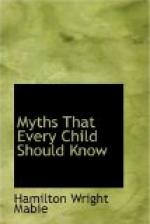“And have you never seen him, my fair maiden?” asked Bellerophon of the girl, who stood with the pitcher on her head, while this talk went on. “You certainly could see Pegasus, if anybody can, for your eyes are very bright.”
“Once I thought I saw him,” replied the maiden, with a smile and a blush. “It was either Pegasus or a large white bird, a very great way up in the air. And one other time, as I was coming to the fountain with my pitcher, I heard a neigh. Oh, such a brisk and melodious neigh as that was! My very heart leaped with delight at the sound. But it startled me, nevertheless; so that I ran home without filling my pitcher.”
“That was truly a pity!” said Bellerophon.
And he turned to the child, whom I mentioned at the beginning of the story, and who was gazing at him, as children are apt to gaze at strangers, with his rosy mouth wide open.
“Well, my little fellow,” cried Bellerophon, playfully pulling one of his curls, “I suppose you have often seen the winged horse.”
“That I have,” answered the child, very readily. “I saw him yesterday, and many times before.”
“You are a fine little man!” said Bellerophon, drawing the child closer to him. “Come, tell me all about it.”
“Why,” replied the child, “I often come here to sail little boats in the fountain, and to gather pretty pebbles out of its basin. And sometimes, when I look down into the water, I see the image of the winged horse in the picture of the sky that is there. I wish he would come down, and take me on his back, and let me ride him up to the moon! But, if I so much as stir to look at him, he flies far away out of sight.”
And Bellerophon put his faith in the child, who had seen the image of Pegasus in the water, and in the maiden, who had heard him neigh so melodiously, rather than in the middle-aged clown, who believed only in cart horses, or in the old man who had forgotten the beautiful things of his youth.
Therefore, he haunted about the Fountain of Pirene for a great many days afterward. He kept continually on the watch, looking upward at the sky, or else down into the water, hoping forever that he should see either the reflected image of the winged horse, or the marvellous reality. He held the bridle, with its bright gems and golden bit, always ready in his hand. The rustic people who dwelt in the neighbourhood, and drove their cattle to the fountain to drink, would often laugh at poor Bellerophon, and sometimes take him pretty severely to task. They told him that an able-bodied young man like himself ought to have better business than to be wasting his time in such an idle pursuit. They offered to sell him a horse, if he wanted one; and when Bellerophon declined the purchase, they tried to drive a bargain with him for his fine bridle.




